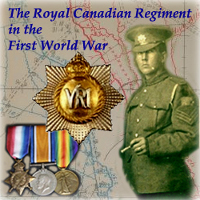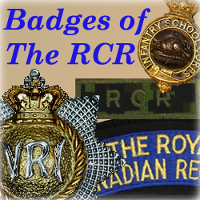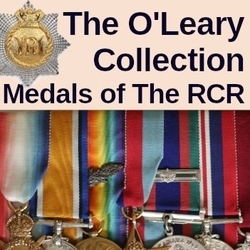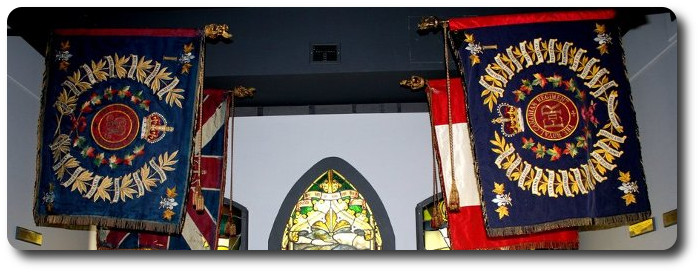
Researching The Royal Canadian Regiment
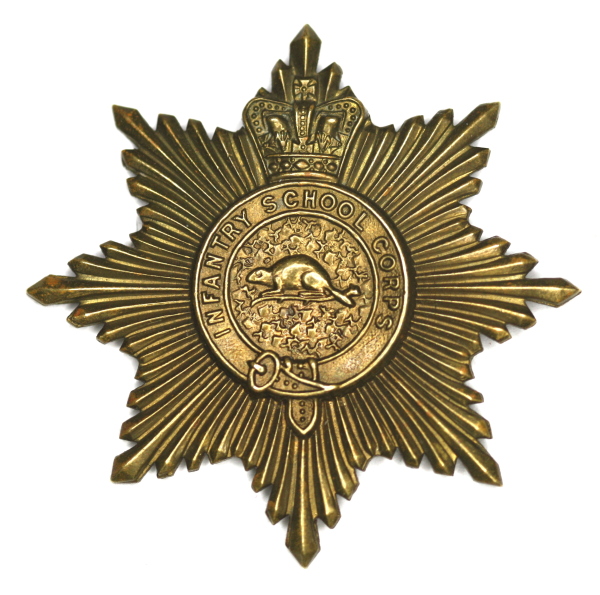
Editor's Note: Harry Rawney of Fredericton, NB, penned some reminiscenses of his early days with The Regiment. The Infantry School Corps was located in Fredericton and occupied buildings at Queen and Carleton Streets, the quarters and guardroom of which are still standing.
The Infantry School Corps - 1890
By: Henry Rawney
(Reproduced from Pro Patria Issue No. 46, August 1981)
I joined the Infantry School Corps of The Royal Canadian Regiment in 1890 in Fredericton, and went into barracks, the old stone barracks on Queen Street Above Carleton. The building has a sundial on the east end of it, and this was the clock which was used to time the bugle calls and our daily routine. It is covered up now by the Bank of Montreal. The Corps was a hundred men strong, privates and non-commissioned officers beside the band, a very fine brass band. There were also, of course, the commissioned officers, permanent and short-course. The latter came, half a dozen at a time, every six months.
Under the arches of the barrack on the ground floor, were the kitchen, storeroom, and canteen. The first floor was taken up by the quartermaster's storeroom, the band room, the sergeants' mess, and at a later time, by a mess-room for the privates. At first the privates used to eat in their sleeping quarters on the top floor, 13 men to a room -twelve privates and one non-com. The bedrooms were heated by a box stove, so a chimney served two rooms. I was in room No.6. We had to saw our own wood, that is the fatigue party did, and haul it on a hand-sled from the woodyard at the back of the square next to the Normal School. Currie, from Currie's Mountain brought the wood.
Our iron cots folded across in the middle, and every morning we placed the folded straw mattress on top of the folded cot, then the blankets, and put a strap round the whole. Insects were bad, and we got our blankets washed by the wives of the married soldiers in Park Barracks on George Street, paying for the work out of our forty cents a day.
Married men and single got the same, the wives received rations but not the children. For rations we got half a pound of bread, half a pound of cheese, and a pound of meat per day. It was roast beef one day and soup - good soup - the next, and a net full of potatoes with their skins on were boiled for each room, but no puddings or dessert. The rations and a large kettle of hot, sweetened coffee were brought up to our rooms by an orderly, but no milk or tea was issued.
We kept the bread and cheese in a box in our room for our breakfast and supper, and one morning before we were awake, Dick, the bear, got loose and raided the rations. He gave one chap quite a scare by pushing his snout into his face.
There was a sameness to the food, but we had beer, which we paid for at tripence a pint, but we were nearly always broke. There was a little fellow by the name of McAlister who held on to his money. One day we picked him up at the foot of the stairs, grabbed him by the ankles and reversed him, shook his pocket empty, and made for the canteen. When Ready of Ready's Beer came up from Saint John once a month, all who could crowd into the canteen got free beer. One other time we got free beer - on the 24th of May, to drink the health of good Queen Victoria. Always on that day we were marched to the Officers' Square and put through a show of manoeuvres.
Colonel Maunsell would not stand for any drinking while on duty. He was a wonderful soldier. a great disciplinarian, and a fine horse-man. It seems strange that after he retired to his home in Ireland as General Maunsell, he should end by being thrown from his horse and killed.
One Sunday morning after the Colonel had inspected us before Church Parade, which took place every Sunday, he gave the order to "Form Fours" and "March". As we left the drill-yard. one man, Hewson, still stood at attention, very straight and looking spic and span but he was too drunk to move. The Colonel was furious and the soldier was hustled off to the guardhouse.
Then there was the case of Sergeant Pokinhorn who had been brought from England to instruct the short course. The Colonel caught him putting the men through their drill while he was tipsy. He was ordered to the guardhouse, reduced to the ranks, and that was the end of Pokinhorn.
There was Morash, too, who shot himself when he was called to the Orderly Room for not attending Church Parade.
I was put in the guardhouse once for losing a prisoner while on sentry duty. The man had picked the lock of the Carleton Street door, out of sight of the sentry. He was never caught, although a bad case. He had gotten drunk and frightened the people on Queen Street by holding them up at the point of a reversed clay pipe.
We had other tragedies. Harvey and Reading disappeared from the sailboat which the infantry owned, and their bodies were not found until months afterwards. The sergeants had their boat. too - a steam launch called the "Glide" and often went up the Oromocto. Sergeant Brewer was one of them.
The Colonel had a shooting range on his place at Spring Hill, and in the summer we used to pitch our tents up there during rifle practice. We used the old Snider rifle. Every week during the winter, the Colonel would head a march in formation. on snowshoes to the music of a piccolo, up the middle of the river to Spring Hill where we would eat our rations and then march five miles back again. It was awfully cold. Many a time I froze my ears. There were ear-tabs, but we were not allowed to turn them down.
Our forage caps were glengarries with the I.S.C. badge on the left side and streamers. When we got them, the ribbons always had to be lengthened, at our expense. We had to pay for alterations to our uniforms. Harris did that, and Anderson made our boots.
Every morning we cleaned and polished our guns - even the stocks, and the white helmets, belts and straps were pipe-clayed. The brass buttons, of course, were polished. When a man went out the gate off duty with swagger stick in hand, he was looked over by the sentry for a dull button or a spot on his white gloves. The sentry was looked over by Sergeant-Major MacKenzie, who used to watch from the verandah, one leg swung over the railing.
We had to shave every day, and one man got two days CB (confined to barracks) for using talcum powder instead of shaving.
When mounting guard, we had to wear full accoutrement, folded greatcoats, bandoliers, and napsacks containing one pair of socks, button stick and brush, a housewife, and a towel and soap. We mounted guard twenty-four hours at a stretch, three men and an officer, and were two hours on and two off.
We liked to get the job of batman, not for the extra dollar a month which we got from the short course officers or the two dollars from the permanent officers, but to escape fatigue duty of cutting, hauling and carrying wood or shovelling snow in winter, and in summer of mowing lawns or raking paths.
About Dick? Well, we got him when a cub and he grew to become a very large black bear. He was kept in the drill yard on a twenty foot chain, fastened to a tall stout post on top of which he sometimes sat. In winter he would dig himself a hole in the snow, coming out now and then. Dick got his rations the same as the men, and was often treated to beer. He would hold the bottle between his paws, tip it up and pull the cork out with his teeth no matter how tight it had been driven in. Sometimes he got tight and would act foolish. Dick liked the red coats. One soldier, Brigham Young we called him, would wrestle with him, and they would swat each other, turn about.
One day Eddie Boyle, the butcher, led a bull through the town and it got away and ran into the drill yard. It saw the bear and charged him. Dick reared up with his back against the post and when the bull got close, knocked him to his knees. The bull charged again, and the same thing happened. I think if Dick had been loose he could have licked the bull, but he was at a disadvantage, so the sergeant shot the bull.
Going to camp at Sussex one summer, between Hampton and Saint John, Dick got loose in the freight car, rolled against the door which opened, rolled into the ditch and through the wire fence. When we got to Sussex, the Colonel sent some soldiers back for him. When Dick got old, he grew ugly and almost killed a soldier. so the sergeant had to shoot him.
The next mascot we had was a goat but we only kept him for about a year, as he got into all kinds of mischief and was too expensive. He was constantly getting loose and always made for Owen's grocery store across the street where there was green stuff displayed in front, and for which we soldiers were made to pay.
The Infantry School Corps, or rather The Royal Canadian Regiment, was sent to Halifax for a month, and from there to serve the three year term at Bermuda. We were replaced by the Berks, the last English regiment to be stationed in Fredericton. When the Great War broke out, we were sent from Bermuda to Halifax, and from there to England, where I was transferred to the 48th Highlanders, or 15th Canadian.
